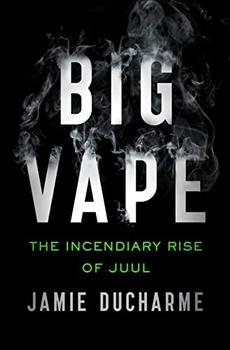Summary | Excerpt | Reviews | Beyond the Book | Readalikes | Genres & Themes | Author Bio

The Incendiary Rise of Juul
by Jamie Ducharme
Fellow Big Tobacco giant Philip Morris, the company behind brands like Marlboro, also experimented with a heat-not-burn product in the 1990s. Philip Morris's Accord required users to place a cigarette into a device about the size and shape of a tape recorder, which would externally heat the tobacco to produce an aerosol. The end of the cigarette was left sticking out, so users could inhale. But it was difficult to get as much nicotine as smokers were used to, and the taste still wasn't great. "It didn't taste good and no one liked it," sums up one former employee who worked on the project. Like Reynolds's predecessors, the Accord was a flop.
Then, in 2003, a Chinese pharmacist named Hon Lik changed everything. Like many children in China, Hon had grown up watching his father puff through a pack a day. Like his father, he eventually became a heavy smoker, too, but as a pharmacist, he knew the habit was unsustainably bad for his health. He quit with the aid of a nicotine patch, but like Adam Bowen, he realized he missed the ritual of smoking. Unlike a cigarette, a patch "does not create a peak. It's a consistent and slow releasing of nicotine," Hon says. And "as a smoker, you have behavioral customs—you hold a cigarette with your hand and put it in your mouth." The patch didn't compare.
To fill the void, Hon developed the world's first modern e-cigarette, which used a lithium-ion battery to power a heating element that atomized a capsule of nicotine-rich liquid, producing an aerosol. Scientifically speaking, an aerosol is different from a vapor: an aerosol comprises tiny particles suspended in gas, whereas a vapor is the pure gas form of a liquid. Not surprisingly, most people did not care about this distinction and eventually began calling the "smoke" that came out of an e-cigarette "vapor," giving birth to both a new word and a new trend: vaping.
With its slim white body and black mouthpiece, Hon's vaping device could easily have been mistaken for a permanent marker, except for the LED light at the tip, which glowed red when a user inhaled. In 2004—shortly after his father was diagnosed with lung cancer—Hon began selling the product in China under the name "Ruyan," which translates to "like smoke." Prior to products like Ruyan, and with the exception of unpopular products like the Accord, smoking was a process that had not fundamentally changed for centuries: dry tobacco, roll it up, light it on fire, inhale. Ruyan felt like a fresh update of that idea, bringing smoking into the increasingly tech-savvy early 2000s. At $208 a pop, the device reportedly earned Hon's company the equivalent of $13 million in 2005 alone. "A lot of consumers were shocked and surprised, in a positive way," Hon says. "They could not believe there was something they could put in their pocket and smoke like a cigarette anytime, anywhere they like."
Early e-cigarettes weren't perfect, but they at least offered a new take on smoking—and this appealed to Adam and James. They realized very early on that people didn't necessary want a "safer" cigarette like the Eclipse or Premier, which usually ended up being a less satisfying and less palatable version of the product they really wanted. Plus, cigarettes had major baggage. People associated them with being dirty, messy, smelly, and toxic. It seemed better to leave all that in the past and give people a product that improved upon the cigarette, rather than a poor approximation of it—a product that would make them forget they had ever craved cigarettes at all. "A new brand, a new company, a trustworthy brand whose goals are aligned with [the] needs of public health, was needed," James later told the Mercury News when describing this realization. "Instead of creating safe cigarettes, we created a superior product offering, which keeps some aspects on why people love cigarettes but not any of the ones they don't like." This "superior product offering" was Adam and James's master's thesis project, Ploom.
Excerpted from Big Vape by Jamie Ducharme. Copyright © 2021 by Jamie Ducharme. Excerpted by permission of Henry Holt and Company. All rights reserved. No part of this excerpt may be reproduced or reprinted without permission in writing from the publisher.
Your guide toexceptional books
BookBrowse seeks out and recommends the best in contemporary fiction and nonfiction—books that not only engage and entertain but also deepen our understanding of ourselves and the world around us.